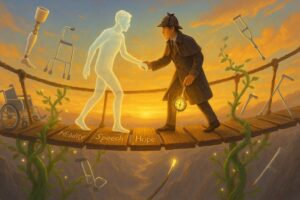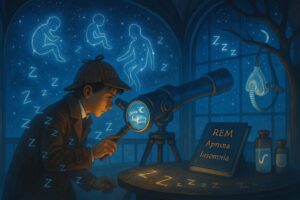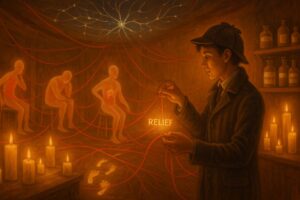
Oncology
- Posted by admin
- Categories Complex & Integrated Medicine
- Date May 23, 2025
- Comments 0 comment
The Cancer Detective’s Domain - Cracking the Cases of Growth, Spread, and Fighting with Grace
1. Introduction: The Scene of the Specialty
Step into the shoes of an Oncology sleuth.
This is the frontline of one of medicine’s greatest battles—where the clues are hidden in masses, mutations, and metastases. Oncologists investigate rogue cells that break the rules, multiplying beyond control and crossing boundaries. They listen to symptoms that whisper malignancy and track tumours like fugitives—mapping their origin, pathway, and plan of attack. Welcome to a world where science meets suffering, and every decision must weigh evidence, empathy, and time.
2. Key Mysteries They Solve (Common Conditions)
These detectives specialise in solving cases involving:
- Solid Tumours – breast, lung, colorectal, prostate, and more—each with its own behaviour and biology.
- Metastatic Disease – secondary spread where origin is sometimes unknown.
- Paraneoplastic Syndromes – distant clues from tumours acting like hormones or triggers.
- Treatment Planning – navigating surgery, chemotherapy, immunotherapy, and radiation.
Each case is not just a diagnosis—it’s a journey, often with no clear map.
3. Their Trusted Tools & Techniques
Every detective has their kit—and in Oncology, tools may include:
- Biopsies & Histopathology – the definitive diagnosis in cellular form.
- Staging Scans (CT, PET, MRI) – mapping spread like crime scene forensics.
- Tumour Markers & Genomic Profiling – guiding personalised treatment.
- Multidisciplinary Teamwork – collaboration with surgeons, radiologists, pathologists, and palliative care.
This is detective work that continues through diagnosis, treatment, and sometimes, farewell.
4. The Charms of This Field: Why It Captivates the Curious
- Human Connection: You walk closely with patients through life-changing chapters.
- Scientific Innovation: Oncology leads the way in precision medicine, immunotherapy, and clinical trials.
- Holistic Challenge: Decisions blend biology, emotion, ethics, and timing.
- Victory and Vulnerability: Some patients are cured. Others are comforted. All are changed.
This is medicine with meaning—even when the outcome isn’t control, but care.
5. Challenges: The Toughest Cases They Face
- Prognostic Uncertainty – Cancer doesn’t always follow the rules.
- Emotional Weight – Conversations carry hope, honesty, and sometimes heartbreak.
- Rapid Evolution – New treatments emerge fast, requiring constant learning and adaptation.
- Moral Complexity – When to push, when to pause, when to pivot to palliation.
But the seasoned oncologist knows: healing is not just survival—it’s dignity, clarity, and compassion.
6. Famous Cases and Hallmark Clues
- The “Classic Presentation” – Weight loss, haemoptysis, and a lung mass in a smoker: bronchogenic carcinoma.
- The “Zebra” – Dermatomyositis revealing an underlying ovarian or gastric cancer.
- The “Aha Moment” – Hypercalcaemia in a patient with new bone pain: metastatic spread.
7. Your Training Trail: How to Join the Investigation
To become an Oncology detective:
- Build a strong base in internal medicine and pathology.
- Study the biology of cancer—from mutations to microenvironments.
- Learn to communicate with sensitivity and strength.
- Train in chemotherapy, radiotherapy planning, targeted therapies, and palliative support.
Whether discussing curative intent or crafting end-of-life care plans, you’ll need clinical clarity and emotional fluency.
8. Final Words: The Signature of the Oncology Detective
Oncology detectives chase shadows—of recurrence, remission, and resilience.
They track tumours across organs and time, but also track human hope across fear and fatigue.
They sit in silence, speak with truth, and fight with both science and soul.
So if you are drawn to medicine that is fiercely human, relentlessly evolving, and full of moments that matter—
then this is your battlefield of both logic and love.



